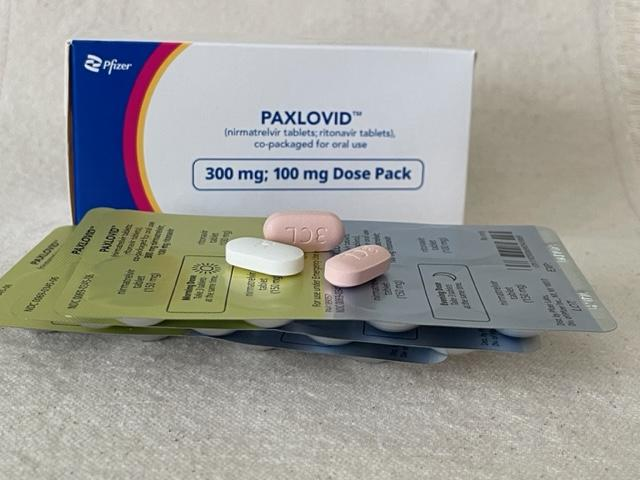A pair of new studies on COVID-19 antiviral drugs suggest that resistance mutations that emerge after treatment with nirmatrelvir-ritonavir (Paxlovid) or remdesivir (Veklury) are rare and that almost a third of US adults have never heard of Paxlovid.
Mutations eventually reverted
Yesterday in JAMA Network Open, a team led by Brigham and Women's Hospital researchers found that resistance mutations that emerge after treatment with Paxlovid or remdesivir—another antiviral drug—are uncommon and transient, suggesting that they are unlikely to contribute to post-treatment viral rebound and to spread in the community amid circulating SARS-CoV-2 variants and antiviral-usage patterns.
As part of the ongoing Post-Vaccination Viral Characteristics Study (POSITIVES), the researchers monitored 156 nonhospitalized adult COVID-19 patients who received Paxlovid (79 participants), remdesivir (14), or no treatment (63) from May 2021 to October 2023. Median patient age was 56 years, and 73.1% were women.
These findings are likely due to a combination of factors, including the greater viral genetic diversity and prolonged duration of active viral replication in the setting of a suboptimal immune response.
In the Paxlovid group, the team identified six emergent Paxlovid resistance mutations previously tied to at least a 2.5-fold reduction in antiviral susceptibility, compared with one such mutation in untreated patients.
Sequencing of viral RNA from repeated patient nasal swabs revealed Paxlovid resistance mutations in nine participants (11.4%), compared with two untreated controls (3.2%). Immunosuppressed Paxlovid-treated participants had the highest frequency of resistance emergence (22.7%), compared with 3.1% of controls.
Rates of Paxlovid resistance were similar among patients who did and didn't experience viral rebound (13.0% vs 10.7%). The vast majority of mutations (90.9%) were found in less than 20% of viruses and had reverted to the wild-type SARS-CoV-2 later in the course of disease. An analysis of Global Initiative on Sharing All Influenza Data uncovered no evidence of increased Paxlovid resistance in the United States after the Food and Drug Administration issued an emergency use authorization for the drug.
The three emergent remdesivir resistance mutations detected in 2 of 14 (14.3%) of participants, both of whom had suppressed immune systems, were also rare and fleeting. They reverted to the wild-type virus after being detected at only one time point. There were too few remdesivir recipients to compare them with untreated controls.
"These results are concordant with our previous reports that immunosuppressed individuals treated with monoclonal antibodies have significantly greater risk of resistance emergence," the study authors wrote. "These findings are likely due to a combination of factors, including the greater viral genetic diversity and prolonged duration of active viral replication in the setting of a suboptimal immune response."
A related commentary by Zhuo Zhou, PhD, of the Chinese Academy of Medical Sciences & Peking Union Medical College, and Peng Hong, PhD, of the VA (Veterans Affairs) New York Harbor Healthcare System, said the inevitable emergence of drug resistance "sets the stage for an ongoing arms race between drug development and pathogen evolution."
While research on antivirals targeting other key SARS-CoV-2 key enzymes continues, "until a new antiviral with similar efficacy emerges, managing nirmatrelvir resistance, especially in vulnerable populations, requires both heightened medical vigilance and clear policy direction," the two experts wrote. "Optimizing treatment regimens and proactively monitoring for new mutations in immunocompromised COVID-19 patients are critical steps toward this goal."
85% have little or no awareness of Paxlovid
In related news, a survey of 1,430 US adults published yesterday in Health Affairs shows that 85% had no or low awareness of Paxlovid, including 31% who had never heard of the drug, 18% who had "heard the name Paxlovid, but [were] not sure what it was specifically," 36% who had "heard a little" about the drug, and 15% who had "heard a lot" about it.
Oral Paxlovid (nirmatrelvir-ritonavir) is highly effective at preventing hospitalization and death from COVID-19, yet it has been remarkably underused.
The Harvard University–led research team conducted the nationally representative survey from July 7 to 16, 2023, to inform rapid communications about COVID-19 treatments by state and local public health departments through the Association of State and Territorial Health Officials and the National Public Health Information Coalition.
"Oral Paxlovid (nirmatrelvir-ritonavir) is highly effective at preventing hospitalization and death from COVID-19, yet it has been remarkably underused, even by patients at highest risk from COVID-19, since its December 2021 introduction in the US," the researchers wrote. "The reasons behind this underuse are still unclear."
They found that, even among respondents who were aware of Paxlovid, many misunderstood its effectiveness (39%), adverse effects (86%), and the need to take the drug within 5 days of symptom onset (61%), all of which may contribute to underuse.
Lower awareness and misbeliefs were more common among medically vulnerable and disadvantaged groups who stand to benefit most from Paxlovid, including those not vaccinated against COVID-19 and those of lower educational attainment or Black or Hispanic race.
"Despite media coverage, direct-to-consumer advertisements, and messaging by public health and health care institutions during COVID-19, these results indicate that a majority of the American public has no or low awareness of Paxlovid," the authors wrote.
"Results suggest that Paxlovid underuse may be partly driven by a lack of effective public communication to generate awareness and knowledge about the drug, leading to low demand," they added. "As Paxlovid loses full government subsidies, further public outreach is needed to ensure that the public accesses it when needed."





















